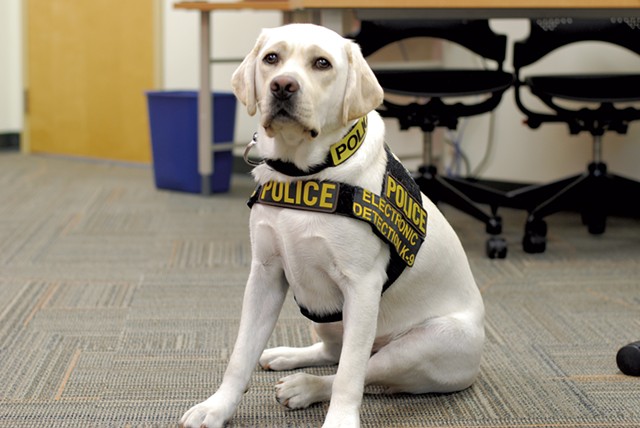
- Mojo, the police dog
Mojo, a 2-year-old Labrador retriever with soft brown eyes, panted eagerly as he started his search. Wagging his tail, the yellow dog paced an office in South Burlington before zeroing in on his target — a Kindle that Detective Matt Raymond had hidden in a recycling bin.
Raymond rewarded Mojo with a handful of dog food and then removed the pup's police vest. Mojo plopped onto the floor and rolled over for a belly rub.
This search was just for show, but when Mojo is on the job, he sniffs out electronic devices that may contain child pornography.
Raymond, of the Attorney General's Office, leads the Vermont Internet Crimes Against Children Task Force, and Mojo is his teammate: an "electronics detection dog" trained to track down e-readers, cellphones and thumb drives by scent.
In an increasingly high-tech world, criminals can hide thousands of gigabytes of illegal images on devices so tiny, it can take hours — or prove impossible — for police to find them, Raymond said.
"We never want to go to a scene and leave and think we didn't do everything possible to find a device which could rescue a child from abuse," he explained.
Mojo has quickly proved his worth. In half of the 22 cases he has worked since joining the task force in January, the dog has discovered equipment human searchers missed. In May, the Attorney General's Office touted Mojo's abilities in a news release that announced the arrests of four men who were charged with possession of child porn. In another case, Mojo found a camera microchip about the length of a fingernail.
The dog's secret? He has been trained to detect the scent of triphenylphosphine oxide, a chemical used in data-storage devices. A crime lab chemist in Connecticut isolated the compound, allowing Connecticut State Police in 2013 to train the first two dogs capable of detecting electronic devices.
Mojo, of course, doesn't understand the dark nature of his work. Searching for electronics is his human's favorite game, and he's eager to please.
He gets excited about showing Raymond items he's found and getting fed, the detective said.
The dog knows the search is on when Raymond puts a police vest on him and takes out a baggie of treats. Mojo leads the way on his leash, quickly circling a room. When he pinpoints a chemical smell, he crouches, his nose turned to a specific area. He can search a typical bedroom in a matter of minutes, Raymond said.
Mojo is one of about 30 electronics detection dogs working in the United States. Todd Jordan, a police dog trainer in Indiana, schooled most of them. Jordan taught Mojo for five months, after the canine flunked out of a service dog school for being too rambunctious.

- Matt Raymond feeding Mojo
Raymond met Jordan at a national conference on child exploitation in Atlanta in June 2017 and asked for his help obtaining a dog for Vermont's task force. Mojo didn't come cheap — he cost $11,000. A grant from the federal Office of Juvenile Justice and Delinquency Prevention paid for him.
Jordan said he matched Mojo with Raymond because the young dog is hyper, goofy and driven — qualities he thought were well balanced by Raymond's calm, patient personality.
The detective couldn't be happier with his new partner. "I love him completely," Raymond said. Mojo lives with Raymond, his wife and their 9-pound, 14-year-old Chinese crested powderpuff, Pandy. Raymond said Pandy is definitely the alpha dog, but the pups get along well. Pandy tags along when Mojo practices searching at home.
Mojo is a food reward dog, so he eats only after he finds electronics. That doesn't mean he is underfed. Raymond measures out an appropriate amount of kibble every morning and feeds Mojo by hand throughout the day during practice searches. The hand feedings help them bond, and the daily training has familiarized Raymond with subtle signs, such as changes in breathing, that indicate Mojo has caught a scent.
When Mojo's police vest comes off, he's just a typical dog, said Raymond. "You wouldn't know on the weekend that he's a work dog, because he acts just as goofy as the next dog — which is what I want for him," he said.
Police patrol dogs are taxed, physically and mentally, when protecting their officers, said Raymond, who worked with a German shepherd when he first started in law enforcement. The dangerous nature of those dogs' work requires retirement after a set number of years. Mojo's job poses no such risks. He arrives at a potential crime scene only after a warrant has been obtained, the area has been deemed safe and police officers have conducted an initial search.
When a Seven Days reporter sat down to pet Mojo, he promptly crawled onto her lap. The pooch is not just allowed to snuggle; his friendly nature has proved an unexpected bonus. Uncovering crimes against children takes a mental toll on officers, Raymond said, and Mojo is a "little ray of sunshine" for the task force. In fact, Raymond can track the retriever by listening to people saying "aw."
"If it's an office day and I'm checking my email, he'll go check in with everybody, and I can hear which cubicle he's at because you can hear him brightening everyone's days as he goes around," Raymond said.
Mojo also helps soothe any children present when a suspect is arrested at home. Raymond said that even in extremely stressful situations, kids light up when they see the dog.
"He loves everybody," Raymond explained.










Comments (2)
Showing 1-2 of 2
Comments are closed.
From 2014-2020, Seven Days allowed readers to comment on all stories posted on our website. While we've appreciated the suggestions and insights, right now Seven Days is prioritizing our core mission — producing high-quality, responsible local journalism — over moderating online debates between readers.
To criticize, correct or praise our reporting, please send us a letter to the editor or send us a tip. We’ll check it out and report the results.
Online comments may return when we have better tech tools for managing them. Thanks for reading.